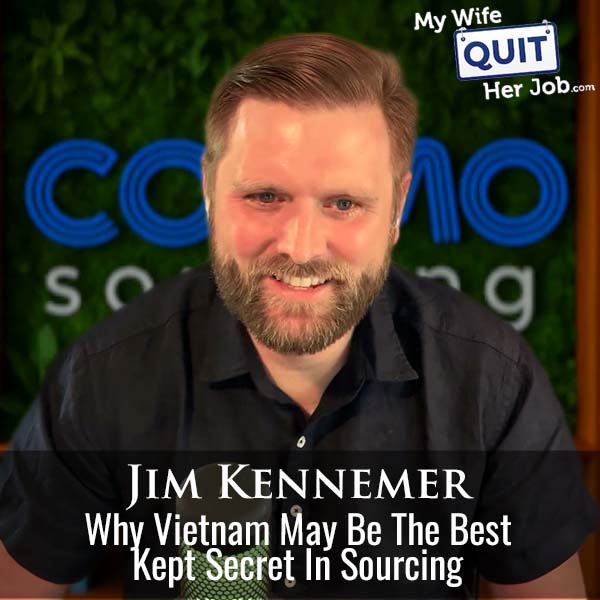603: Why Vietnam May Be The Best Kept Secret In Sourcing With Jim Kennemer

```html Vietnam Emerges as a Key Sourcing Alternative Amid Tariff Uncertainty As trade tensions continue to reshape global supply chains, Vietnam is increasingly being recognized as a viable and competitive alternative to China for sourcing goods. While China has long been the dominant player in manufacturing, rising tariffs and evolving geopolitical dynamics are prompting businesses to explore other options. Vietnam, with its growing manufacturing capabilities and strategic location, is emerging as a prime beneficiary of this shift.
The Allure of Vietnam: Cost, Flexibility, and Overlooked Potential According to Jim Kennemer, founder of Cosmosourcing and sourcinghub.io, Vietnam offers a compelling value proposition for businesses seeking to diversify their sourcing strategies. Kennemer, who has extensive experience working with factories and suppliers in Vietnam, emphasizes that the country often provides cheaper and more flexible options compared to China. "Vietnam is often cheaper, more flexible, and surprisingly overlooked," says Kennemer. "Many sellers are still fixated on China, but Vietnam offers a robust sourcing ecosystem that can be highly advantageous."
Expert Perspective: Navigating Tariff Volatility The ongoing uncertainty surrounding tariffs is a major concern for businesses engaged in international trade. Kennemer notes that fluctuating tariff rates and ambiguous regulations make it difficult for companies to make informed decisions about sourcing. He highlights the challenges posed by inconsistent information and the potential impact on purchase agreements. "People just want certainty, and there's not certainty in tariffs," Kennemer explains. "We've seen situations where decisions worth millions of dollars are based on a single social media post, which is incredibly risky."
Historical Context: The Rise of Vietnam's Manufacturing Sector Vietnam's emergence as a manufacturing hub is not an overnight phenomenon. Over the past few decades, the country has steadily invested in infrastructure, education, and policy reforms to attract foreign investment and develop its industrial base. The "Doi Moi" reforms, initiated in 1986, marked a significant turning point, transitioning Vietnam from a centrally planned economy to a more market-oriented system. This transformation has fostered economic growth and created a favorable environment for manufacturing. The country's strategic location, with access to major shipping lanes and proximity to key markets in Asia, has further contributed to its attractiveness as a sourcing destination. Additionally, Vietnam's relatively lower labor costs compared to China have made it a competitive option for manufacturers seeking to reduce expenses.
Current Challenges and Opportunities Despite its advantages, sourcing from Vietnam is not without its challenges. Higher minimum order quantities (MOQs) are a common concern, particularly for smaller businesses. Kennemer acknowledges that Vietnamese factories often expect larger initial orders, which can be a barrier to entry for some companies.
MOQs: Expect higher MOQs compared to China, especially for first-time buyers. Tariff Uncertainty: Fluctuating tariff rates and regulations require careful monitoring. Infrastructure: While improving, Vietnam's infrastructure may not be as developed as China's in certain areas.
Specific Industries: Apparel and Textiles Lead the Way Certain industries are particularly well-suited to sourcing from Vietnam. Apparel and textiles stand out as a strong area of expertise, with a well-developed industry and a large workforce. "Apparel and textiles are better in Vietnam flat out, without tariffs being factored in," Kennemer asserts. "It's their most developed industry, with over 6,000 factories employing over two million people."
Navigating the Sourcing Landscape: Key Considerations Businesses considering sourcing from Vietnam should carefully evaluate their specific needs and requirements. Factors such as product type, order volume, and quality standards should be taken into account. Conducting thorough due diligence and establishing strong relationships with reliable suppliers are essential for success.
According to industry analysts at Global Trade Review, "Diversifying sourcing strategies is no longer a luxury but a necessity. Companies need to proactively explore alternative sourcing destinations to mitigate risks and enhance resilience."
As the global trade landscape continues to evolve, Vietnam is poised to play an increasingly important role as a sourcing hub. By understanding the opportunities and challenges associated with sourcing from Vietnam, businesses can make informed decisions and build more resilient and competitive supply chains. ```
Originally sourced from: WifeQuitHer Job
